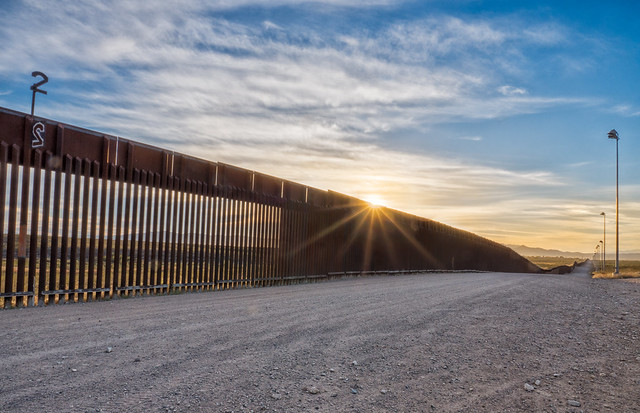A US congressman and environmental group have filed the first lawsuit targeting Donald Trump’s plan to build a 30-foot wall on the US-Mexico border.
 Photo by Gary Goodenough, Flickr A section of the existing border fence between Arizona and Mexico. A US congressman is calling for an environmental impact assessment before a border wall is built.
Photo by Gary Goodenough, Flickr A section of the existing border fence between Arizona and Mexico. A US congressman is calling for an environmental impact assessment before a border wall is built.
The suit, brought by Congressman Raúl M. Grijalva of Arizona and the Center for Biological Diversity in the US district court for Arizona, seeks to require the government to undertake a comprehensive environmental impact analysis before beginning construction.
Such a review would probably take several years to complete, delaying indefinitely the fulfillment of one of Trump’s signature campaign promises.
“It will take a significant amount of time to thoroughly analyze [the impacts of the wall], and that’s the point,” said Randy Serraglio, a spokesman for the Center for Biological Diversity.
“What we learned about the border wall in the past 10 years is that it’s hugely expensive, it doesn’t work, and it does a tremendous amount of damage,” Serraglio said. “The people in the United States have the right to know what the damage is going to be, what it’s going to cost, and whether it’s going to be effective. Those are questions the Trump administration is not interested in answering.”
The lawsuit invokes the National Environmental Policy Act, which requires environmental review of major federal programs.
The Department of Homeland Security and Customs and Border Protection, which are named as defendants, declined to comment on pending litigation.
Trump began his presidential campaign in June 2015 with the promise of a border wall to keep out Mexican immigrants, whom he characterized as “criminals” and “rapists.” In the first week of his administration, he signed an executive order calling for homeland security to “begin immediate construction” of the wall.
Homeland Security has since begun a bidding process for contractors to build prototypes for the multibillion-dollar project. Still, a lack of interest from major construction firms and a lack of funding from Congress may mean that the proposal never moves beyond a border wall beauty pageant expected to take place in San Diego this summer.
“American environmental laws are some of the oldest and strongest in the world, and they should apply to the borderlands just as they do everywhere else,” Grijalva, a Democrat, said in a statement. “These laws exist to protect the health and well-being of our people, our wildlife, and the places they live. Trump’s wall — and his fanatical approach to our southern border — will do little more than perpetuate human suffering while irrevocably damaging our public lands and the wildlife that depend on them.”
Serraglio said the existing border fence had already caused significant environmental damage, including flooding and erosion.
In July 2008, a heavy thunderstorm produced a damaging flash flood at the Organ Pipe Cactus National Monument in Arizona after the border fence prevented water from flowing away naturally.
On the same day, border infrastructure was responsible for the deaths of two people and $8 million in damage to Nogales, Mexico, when water was trapped on the south side of the border.
Expanding construction on the border could exacerbate the flooding problems, in addition to threatening the survival of species, such as jaguars, ocelots and wolves, Serraglio said. Additional environmental degradation would probably be caused by the construction of new roads and infrastructure to enable construction of the wall in remote wilderness areas.
The Department of Homeland Security produced an environmental impact statement about border enforcement programs in 2001.
Thursday’s suit is not the first time Trump’s policies have attracted legal challenges. Both of Trump’s attempts to impose a travel ban on several Muslim-majority countries have been blocked by federal judges. On 5 April, 17 states sued to attempt to block Trump’s efforts to rescind climate change regulations.
“What’s happening now is not driven by any rational analysis of border security needs,” said Serraglio. “It’s driven by Donald Trump’s ridiculous campaign rhetoric, and that is not a sound basis for public policy.”
We don’t have a paywall because, as a nonprofit publication, our mission is to inform, educate and inspire action to protect our living world. Which is why we rely on readers like you for support. If you believe in the work we do, please consider making a tax-deductible year-end donation to our Green Journalism Fund.
Donate